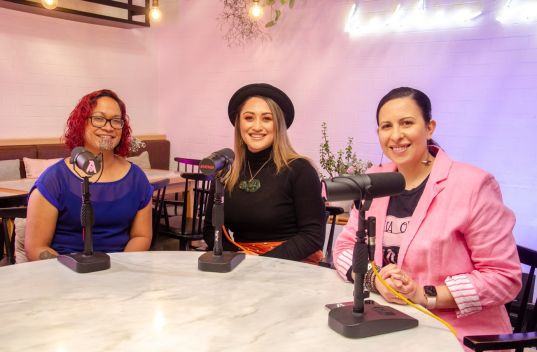Contraception: Patua te taniwha ko te whakamā – beating the taniwha of shame
Being brave in the face of whakamā, shame and awkwardness, Māori women are pulling back the curtain on contraception so that things will be easier for kōtiro, wāhine and whānau of the future.
“‘Whare Tangata’ is a video series dedicated to informing māmā about things that affect our whare tangata and tinana,” says producer Kahurangi Milne (Ngāti Whakaue, Ngāti Rangiwewehi), “It’s also about making a safe space to wānanga those things.”
Watch Whare Tangata series highlights.
“We created the series because we don’t have enough kōrero out there about this, that informs us, that most importantly empowers us to know what to do with our tinana,” says Kahurangi, who is also the founder of an online community of more than 5000 Māori mothers, Kia Ora Māmā.
Te Hiringa Hauora | Health Promotion Agency supported ‘Whare Tangata’ as part of its First 1,000 Days programme. The work focuses on quality of life for mothers and babies, so they get equitable outcomes from generation to generation.
“The time before conception is important. It’s when the wellbeing of future parents can be secured, so that if a pregnancy does happen, the first 1,000 days have the best chance of being positive for both the parents and the child,” says Tanya Radford, First 1,000 Days Programme Lead.
Tanya explains that access to sexual and reproductive health services, information and education is a human right. It is fundamental to good health and wellbeing.
“Contraception is used by many women for over 30 years of their lives, so it makes sense to talk about it. But it can be complicated. For some, it’s easy to find what works. For others, there are barriers including cost, information and access to services. In 2020 a Family Planning survey of over 6,500 people found that one in four were not using their preferred contraception option and that education and stigma are still major barriers.”
Over the four part series, Kahurangi and other māmā Māori sit down with obstetrician, gynaecologist and mother Dr Kasey Tawhara (Ngāti Raukawa) to tackle kaupapa including why women need to take the pill regularly, the fear of tapu, what to ask a health professional, sharing responsibility with tāne and why women might want contraception in the first place – including to allow healing after trauma.
Through the Kia Ora Māmā community, Kahurangi saw “a huge disconnect” between the information available about contraception, and the awareness māmā have of it. Many wāhine are left to make decisions in a vacuum or solely through the influence of friends or whānau, she says.
“Māmā want a series on this kaupapa. They are calling for information about contraceptive options. They want to know who to talk to, what to ask and what is out there.”
‘Whare Tangata’ is an example of partnerships based on community innovation and leadership. Communities already know what they need, says Tanya.
“Communities have the knowledge and experience to find solutions. ‘Whare Tangata’ will go a long way to helping both the Kia Ora Māmā community and people in the health sector, understand the realities behind the contraception choices wāhine Māori are making, why and what needs to change.”
-
‘Kia Ora Māmā’ was created in 2019 to uplift and empower māmā Māori. It is now an international online community of more than 5000 māmā Māori who agree that te ao Māori shapes their motherhood journeys. Together wāhine share in the struggles and celebrations of motherhood.
-
Te Hiringa Hauora also partnered with Arataua/Kia Ora Māmā in 2020 to create a maternal wellbeing series in response to COVID-19 and its impact on whānau. It was dedicated to supporting Māori during a time of isolation, stress and high anxiety. Episodes focused on single māmā, mothers raising whāngai children, mothers juggling motherhood and business and new mothers.

